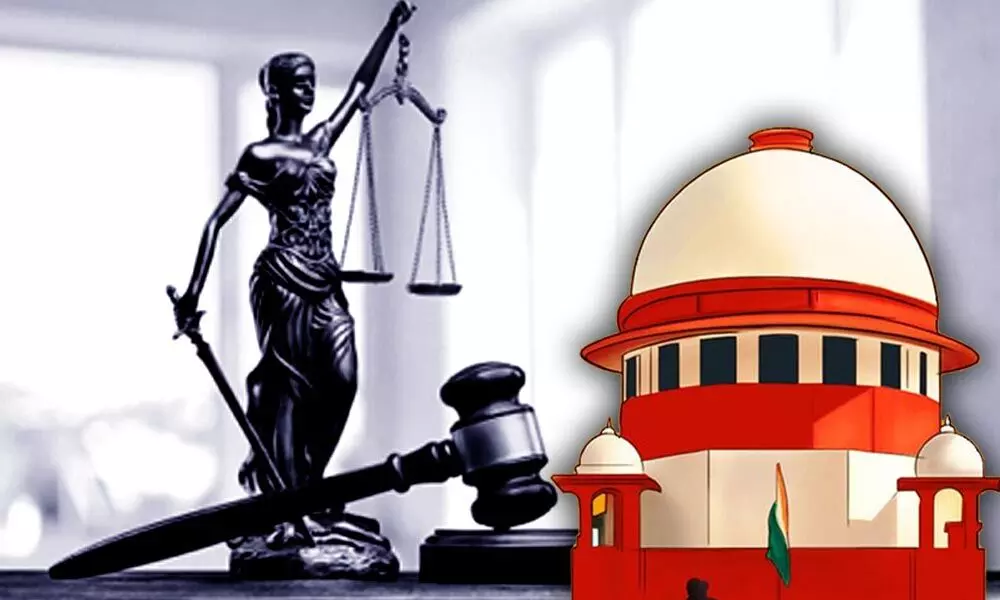Live
- Garena Free Fire Max Redeem Codes & Exclusive Rewards – December 25, 2024
- Belagavi glows celebrating centenary of historic Congress session
- Tigress ‘Rani’ at Pilikula zoo delivers two cubs
- For 10 yrs, govts have not followed 60-day session rule
- Now cattle to be issued Aadhaar ID
- OnePlus 12 Price Slashes to Rs 52,999 Ahead of OnePlus 13 Launch
- Vijayawada: Christmas celebrated at PB Siddhartha
- Tremors due to adjustments in Gundlakamma fault: Scientists
- IG lauds police for crime control in district
- Revised biography of Naveen not based on facts: BJD
Just In
Supreme Court notice to Centre on plea seeking directions for uniform healthcare standard


Supreme Court
The Supreme Court Tuesday sought the Centre's response on a plea seeking directions for a uniform standard of healthcare for citizens in line with the Constitution by adopting the provisions of the Clinical Establishments Act, 2010.
New Delhi: The Supreme Court Tuesday sought the Centre's response on a plea seeking directions for a uniform standard of healthcare for citizens in line with the Constitution by adopting the provisions of the Clinical Establishments Act, 2010.
The plea has also sought directions for operationalising all the provisions of the Act, as well as Clinical Establishment Rules, 2012 in order to ensure affordable and quality healthcare. A bench comprising Chief Justice N V Ramana and Surya Kant issued notice to the government and others on the plea filed by Jan Swasthya Abhiyan, Patients' Rights Campaign and K M Gopakumar. Senior advocate Sanjay Parikh, appearing for the petitioners, argued that the Clinical Establishment Act (CEA) came after several committees' recommendations and National Policy on Health and provided guidelines for determining charges and standard treatment.
The plea has sought directions for notification and implementation of the conditions for registration of clinical establishments such as observance of minimum standards, display of rates for procedures and services, compliance with the standard treatment protocol, as provided in Sections 11 and 12 of the CEA read with Rule 9 of the Rules, 2012. The plea has also sought directions that a grievance redressal mechanism be created for the patients at the district, state and national level till the lacunae in the CEA are filled by a suitable legislation.
The PIL said the duty to provide healthcare to citizens was put on the government under Article 47 of the Constitution; however, the public healthcare system did not proceed as conceived and treats only 30 per cent of the patients, while the rest are treated by the private sector. The petition contended that the public healthcare system suffers from a lack of public health infrastructure and human resources, non-availability of medicines, lack of public investment and forced dependency on the private sector. The plea submitted that there is an urgent need to develop the public healthcare system in India by providing proper infrastructure and sufficient budget to ensure that the maximum facilities exist in the public domain, not only in normal times but also at the time of emergencies such as COVID-19.
Since it will take time and investment to develop the public health infrastructure, there is an urgent need to regulate the private healthcare providers to ensure access to affordable and quality healthcare to citizens, the plea said. "If the provisions of the Clinical Establishments Act 2010 are implemented, which apply both to the public and private sector, it would be possible to control some of the ailments from which the private medical the sector is suffering from and also provides an enabling environment to enjoy the right to health guaranteed under Article 21 of the Constitution and Article 12 of International Covenant on Economic, Social and Cultural Rights," the plea said.

© 2024 Hyderabad Media House Limited/The Hans India. All rights reserved. Powered by hocalwire.com






